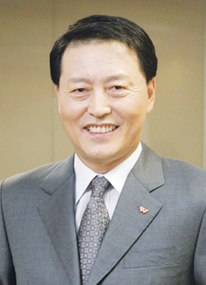SKT Likely to Follow Suit
Considers a move to counter KT's consolidation with KTF, it roils the Korean telecom market
The Korean telecommunications market is expected to experience tremendous changes in the wake of Korea's largest fixed-line service provider KT's forthcoming merger with its mobile telecom affiliate KTF.
Word has surfaced about the possibility that SK Telecom, the nation's leading mobile telecom service provider, might consolidate with SK Broadband, its affiliate provider of such broadband-based services as IPTV (Internet Protocol Television).
SK Telecom might consider a merger with SK Broadband in a desperate measure designed to counter what will be a mega-company born out of the merger of KT and KTF, business sources said.
KT got the initial go-ahead for its plan to merge with KTF from the Fair Trade Commission on Feb. 25, saying that it found no evidence that it would hinder competition in the market. KT's merger plan later clearned the final hurdle - the green light by the Korea Communications Committee.
SK Telecom would face an additional corporate tax of an estimated 200 billion won if it merges with SK Broadband, the successor of Hanaro Telecom, within two years after the Korean telecom giant took over the broadband-based service provider. Two years have to pass for the consolidated company to merge again without the additional corporate tax. SK Telecom handed over Hanaro Telecom in early 2008.
SK Telecom officials said a consensus has been building over the need to advance SK Telecom's merger with SK Broadband as a last-minute response to KT's consolidation with KTF.
Cho Sung-eun, an analyst at Mirae Asset Securities, said, "It (SK Telecom's merger with SK Broadband) might happen earlier than thought. This is the reason SK Telecom might feel a sense of crisis in which it may lose the hegemony over the domestic telecommunications market and advance the timing of the consolidation proposal." Sung Jong-hwa, an analyst at Meritz Securities Co., said, "In a broader perspective, the consolidating of telecom companies means the process of evolution, so SK and LG telecom companies are likely to fall into step through the mergers."Even though the company wants to take its time in merging with its telecom affiliate, KT's move to consolidate with KTF will likely prompt other telecom companies to follow suit at faster pace, he said.
Sung said it is not burdensome for SK Telecom to be merged with SK Broadband as the former takes as much as a 43.2 percent stake in the latter. While the additional corporate tax that would be levied for advancing the merger could cause a psychological burn to SK Telecom, a delay could impose extensive long-term costs on the company. An SK Telecom spokesman categorically denied the speculation about SK Telecom's merger with SK Broadband, saying that an additional tax burden coming from another merger is a minor one, but it is a matter for discussion and would have to be approved by shareholders. nw
 SK Telecom Posts 11.6 Tln Won in Revenue in 2008
SK Telecom Posts 11.6 Tln Won in Revenue in 2008
The revenue rises by 3.4 percent over the previous year
SK Telecom (President & CEO Jung Man-won) announced its earnings for the year 2008: revenue of 11.675 trillion won, operating income of 2.060 trillion won and net income of 1.278 trillion won. The revenue increased by 3.4% compared to the previous year to record KRW 11.675 trillion backed by gradual increase in the number of subscribers and growth in interconnection revenue despite various discount plans and SMS tariff cut that took place since January 2008.
Marketing expenses in 2008 marked 3.064 trillion won, up by 7.3% compared to the previous year due to competition in WCDMA marketing, which was especially fierce during the first half of 2008. Marketing expenses took up 26.2% of the company's revenue.
Operating income recorded 2.060 trillion won, contracting 5.1% compared to 2007, resulting from increases in marketing expenses and depreciation expenses caused by expanded investment in WCDMA. Net income in 2008 stood at 1.278 trillion won, representing a 22.2% decline compared to the previous year with a decrease in equity method gain and increase in non-operating expenses due to the reflection of market price of SK Telecom's equity in LG Powercom Co., Ltd.
Furthermore, SK Telecom announced that a total of KRW 1.919 trillion was invested in year 2008 to secure WCDMA coverage and enhance call quality.
The 2008 cumulative number of subscribers climbed by 5% compared to 2007 to reach 23.03 million and average revenue per user (ARPU) edged down by 3% to KRW 43,016 with the introduction of various discount plans and reduction in wireless Internet ARPU. For the fourth quarter of 2008, the revenue increased by 3.7% quarter-on-quarter to mark KRW 3.007 trillion. Also compared to the previous quarter, the operating income went down by 7% to stand at KRW 468.8 billion and net income dropped by 21% to mark KRW 263.1 billion.
SK Telecom's CFO Dong-Hyun Jang said, "SK Telecom will increase the number of flat rate data plan subscribers to revitalize the wireless internet business and create a solid foundation for sustained growth by advancing WCDMA while strengthening its core competitiveness." nw
SK Telecom President Jung Man-won
3Fl, 292-47, Shindang 6-dong, Chung-gu, Seoul, Korea 100-456
Tel : 82-2-2235-6114 / Fax : 82-2-2235-0799